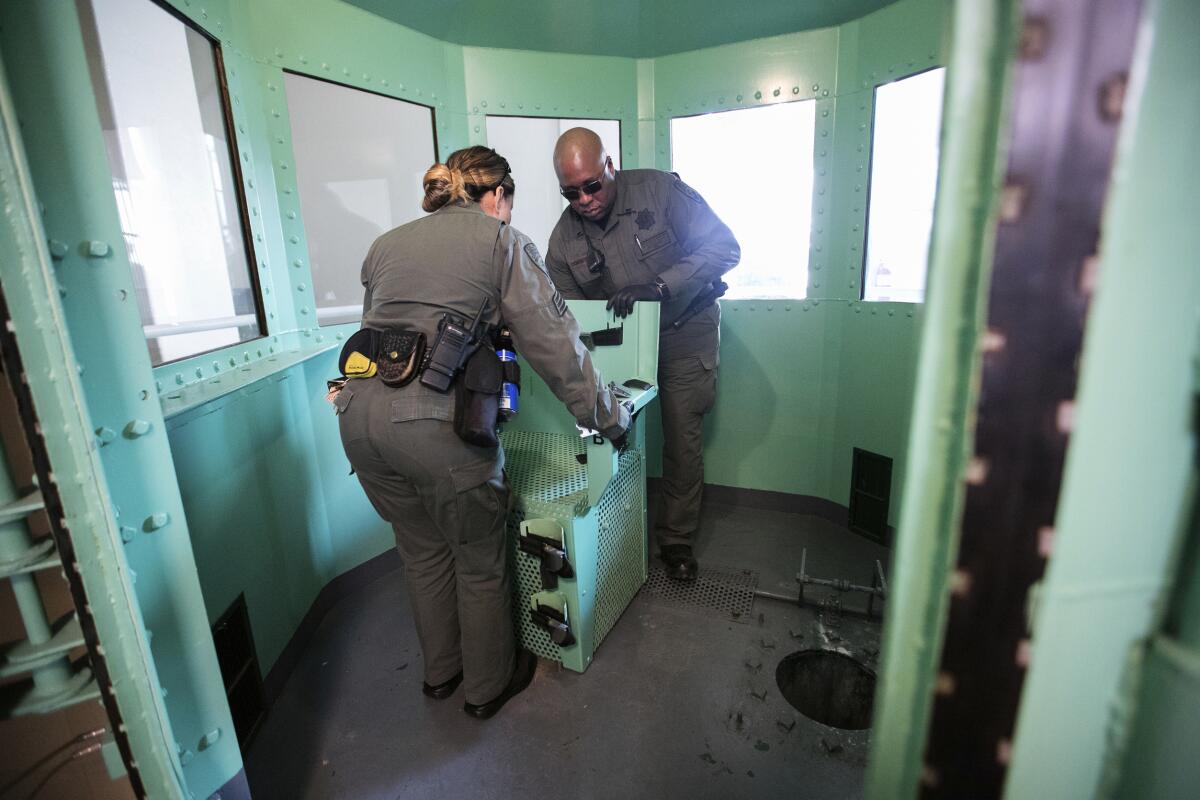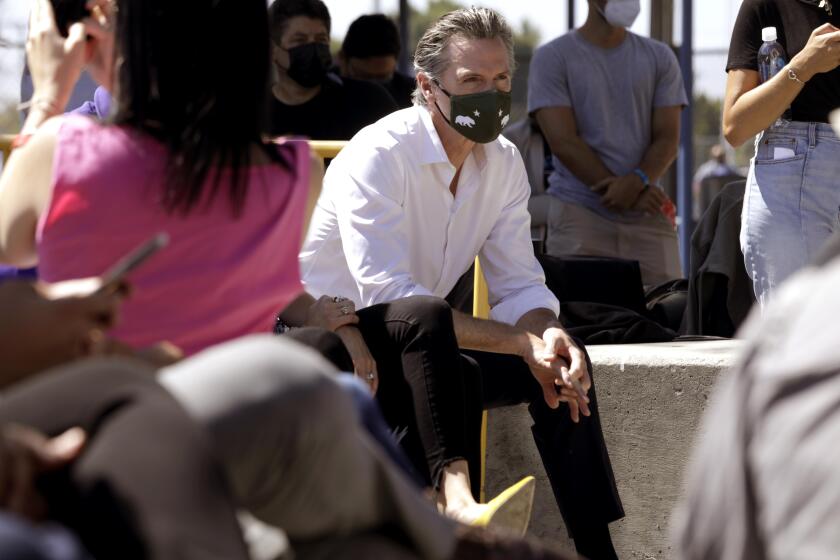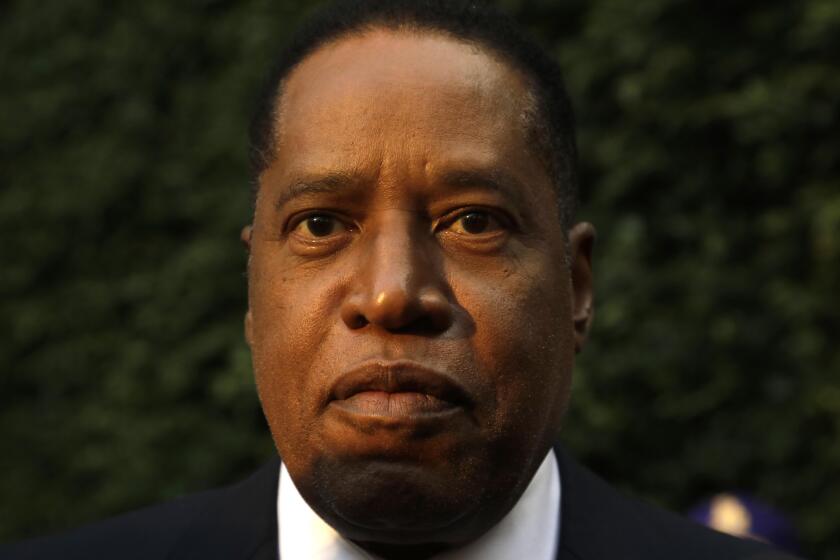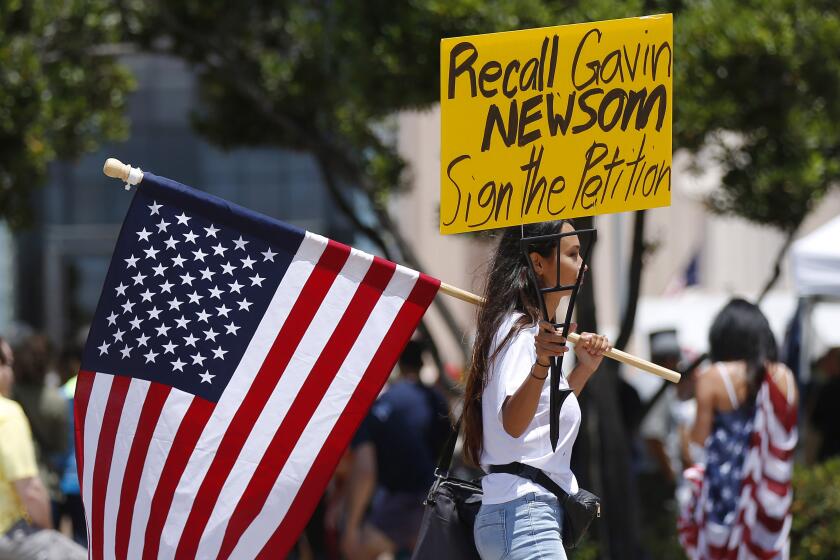Remember Schwarzenegger’s Sacramento shakeup? If a Republican wins Tuesday, it could happen again

- Share via
SACRAMENTO — On his first day as California governor, Republican Arnold Schwarzenegger called state lawmakers into a special session and demanded they repeal a law that made immigrants who entered the U.S. illegally eligible for driver’s licenses.
The Legislature obliged, despite being controlled by Democrats who had passed the law just months before. Their about-face showed just how much political sway governors wield the moment they step into office and assume executive authority.
If California voters decide to recall another Democratic governor, Schwarzenegger’s shakeup of Sacramento, fueled by the political uprising that led to the recall of then-Gov. Gray Davis, has a chance to repeat itself next week. The top GOP candidates hoping to replace Gavin Newsom all have vowed to upend a state Capitol held under firm Democratic rule for more than a decade.
A Republican governor’s authority would likely be held in check by the state Assembly and Senate, both of which have Democratic supermajorities whose members could override vetoes and reject nominees to head state agencies and regulatory boards.
California Gov. Gavin Newsom was a rising star in Democrat politics. How did he come to face a recall?
But that does not constitute a firewall, a point Newsom and his political allies throughout the campaign have warned creates a grave threat to Californians.
“Just because we have a Democratic supermajority and a Democratic president, the notion that somehow the people of California would be protected from a radical Republican governor is just false,” said Ann O’Leary, who served as Newsom’s chief of staff during his first two years in office. “The governor of California has a tremendous amount of executive power.”
Newsom himself has not been shy about using that power since taking office in 2019.
By executive order, Newsom enacted a moratorium on the death penalty, banned the controversial oil extraction method of hydraulic fracturing and required all new cars sold in California to be zero-emission by 2035. Newsom also declared a state of emergency at the outset of the COVID-19 pandemic, allowing him to suspend state laws and spend hundreds of millions of dollars on N95 masks and other protective equipment for essential workers without legislative approval or competitive bidding.
A new Republican governor could rescind all of those orders immediately and issue their own.
Conservative talk show host Larry Elder, who recent polls show leads the field of candidates hoping to replace Newsom, has promised to do just that before he sips his first “cup of tea” as governor. Elder said he would repeal the Newsom administration’s statewide mandates for students to wear masks in public school and vaccination requirements for healthcare workers and state employees.
A close look at Larry Elder, the top challenger in the California recall election: his life, his beliefs and his sudden political rise.
Elder promised to declare states of emergency regarding public schools and the homelessness crisis. Elder said that would allow him to fire the state’s “worst teachers” and suspend the California Environmental Quality Act, the landmark law that requires developers to minimize a project’s effects on the environment. He says that would allow homebuilders more leeway in constructing much-needed low-cost housing.
Those orders almost certainly would be challenged in court as an unconstitutional overreach of executive authority. They also would face another major obstacle: The Legislature has the authority to terminate a state of emergency with a majority vote in both the Senate and Assembly, meaning they could block Elder from making good on his promise.
Most of the appointments a governor makes to head state agencies or serve on regulatory boards also require legislative confirmation, giving Democrats the power to reject nominees they find objectionable. And there are a slew of upcoming vacancies that will need to be filled: two on the University of California Board of Regents and three on the board of trustees of the California State University system; one on the state Water Resources Control Board, which regulates water usage; and two on the governing board of the state Independent System Operator, which oversees the electric grid.
Before Schwarzenegger even took office, he already had a string of people lined up for his incoming administration and more than 100 policy advisors crafting plans to reshape state government, said Joe Rodota, who served as Schwarzenegger’s policy chief during his initial run for governor.
Elder is ready to to take charge immediately, said Ying Ma, spokesperson for his campaign.
“Larry wouldn’t sign up for something he wasn’t prepared to do. As candidate, he has held briefings with numerous distinguished experts and as governor, will continue to solicit their advice, whether as members of his administration or as outside advisors,” Ma said. “Larry will be ready to govern on day one.”
Should he or another replacement candidate win on Sept. 14, they would have less than two months to prepare before taking charge of a state government with a $262.6-billion budget, 213,000 full-time employees and a public healthcare system with 12 million people enrolled.
One of Schwarzenegger’s top priorities was to rein in the state spending approved by the previous administration, something a new governor could do just as easily if Newsom is recalled.
“The governor could issue an executive order asking for a review of all the COVID contracts that are currently in force and COVID contracts that are underperforming or rent relief programs,” Rodota said.
California will have its second gubernatorial recall in 18 years. Why is this liberal state so recall crazy?
Democrat Fabian Nuñez, who served as Assembly speaker during Schwarzenegger’s first years in office, said any governor who wins an election arrives in Sacramento with a mandate.
He said he saw it firsthand with Schwarzenegger. In his campaign during the recall, he hammered on the need to scuttle a major hike in the state’s vehicle license fee enacted under the Davis administration, and repeal the law that allowed immigrants who entered the country illegally to obtain driver’s licenses. He succeeded in doing both.
Nuñez wouldn’t be surprised to see that happen again if Newsom is recalled and Californians elect a candidate from the “Trump faction of the Republican Party,” including Elder.
“The first thing that happens is it impacts every Democrat that’s in a swing seat,” Nuñez said. “They start thinking about their own constituencies and about whether or not Trump Republicans are going to have sea legs in the districts they represent.”
At the very least, that could erode the ability of the Democratic legislative leadership to keep their party members in line when, for example, they need their caucus to override a veto.
“If one of these guys wins, it’s going to freak people out,” Nuñez said.
More to Read
Sign up for Essential California
The most important California stories and recommendations in your inbox every morning.
You may occasionally receive promotional content from the Los Angeles Times.














